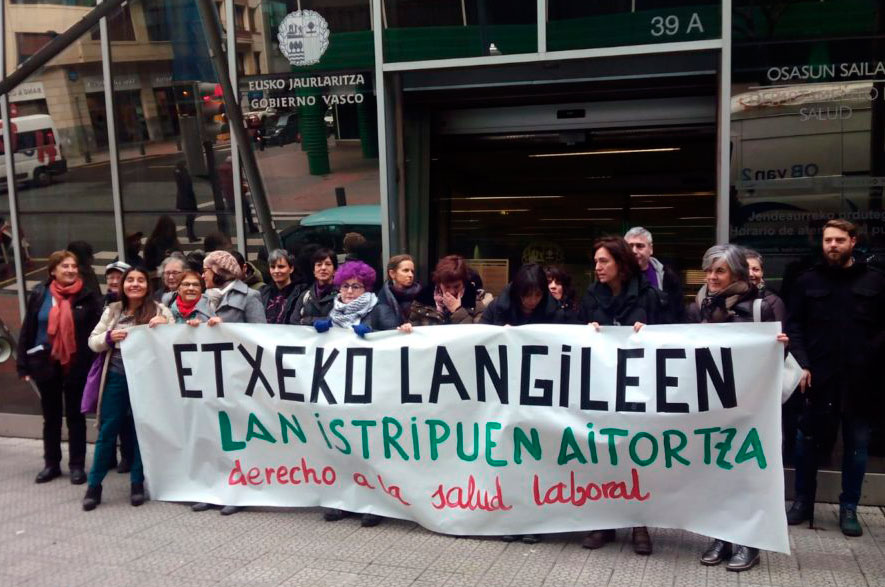
- ELE is the figure provided by the Association of Household Employees with the results of the surveys conducted in Bizkaia. Like every year, it has produced a report on the working conditions of resident and external personnel. 35.38% of the regular situation did not receive the interprofessional minimum wage. The same applies to 67.57% of those who were in an irregular situation.

ELE, Association of Household Employees, launched a free legal advisory service in Bilbao in 1991. They inform workers of their rights and help them to make requests for them. Data from the annual report are drawn from the consultations received at the advisory offices in Bizkaia. The statistics provide the following data: salaries, days, weekly rest, holidays and social security situation.
The Association of Household Employees wanted to focus on two issues. On the one hand, he denounces that Osakidetza practically never recognizes accidents at work and manages them as a common disease. On the other hand, in the first year in which unemployment benefit can be collected, the State Public Employment Service explains that applicants have been mistreated.
Domestic workers are women
In 2023, 603 workers went through the advisory service and received 737 situations. 98.51% of the people cared for were women. 40.43% of the workers were resident domestic workers, that is, they lived in the home of the person they cared for. 59.57% were external workers. 11.13 per cent were indigenous workers and all other foreigners or dual nationals.
The Association has divided resident and external personnel into two groups and drawn the conclusions of each group. These lines inform the situation of resident domestic employees, considering that their working conditions are the most unfavourable.
1: More than a quarter of domestic residents are in an irregular administrative situation. Since 2022, the percentage of women in this situation has fallen by three points. The association has criticized the social services and the immigration authorities because, despite the irregular situation of women, their realities are not unknown. ELE believes that “these women know that they are going to do that job.” They say that they are the worst treaties in the sector and call for rapid regulation of their situation.
2: 69.52% of workers who spend the week in the household work more than 60 hours, which means a maximum number of hours legally allowed. This occurs in 81.08% of women without papers.
44.3% respect their legal rest. This figure is improving every year. Conversely, 21.81% do not rest throughout the week. 21.19% do not have hours of daily rest. It increases the percentage of people resting for two hours a day.
3: In the opinion of the Association, placement agencies mediating between employer and employee promote illegal conditions. It is usual to make a 40-hour contract and not take the so-called hours of presence as part of the day. In this way, these hours are not paid. It denounces that the labour inspectorate does not control this massive fraud.
4th. More and more workers are finding it difficult to take a continuous night break. During the day they care for people with a high dependency and continue to do the same work during the night. The Association believes that lack of night rest causes serious health problems. 45.30% should wake up two or more times in the evening to attend to the dependent person.
5: 97.77% of household employees have not received the corresponding wage. Taking as reference the 40-hour workday, 35.38% in regular situation did not receive the interprofessional minimum wage and 67.57% of the irregular situation. And it's not taken into account that many of these workers have done over 40 hours a week.
6: 34.56% are paid in cash, without any documents. This behavior has declined from 2022. In the absence of documentation, workers also do not have basic data on the employment relationship: employer data, whether or not it is quoted, how much it is quoted…
7: 93.94% of regular workers who worked on working days were discharged from Social Security.
8. 86.16% of the workers lived only with the person or people cared for. 68.67% of the caregivers were women.
9: It denounces that the systematic implementation of day shifts over 60 hours is incompatible with occupational health. They must take care of people who are not self-employed and workers are not guaranteed the training, environment and resources needed to carry out the tasks without harming their health. They criticise the lack of support from the labour inspectorate and Osalan.
10: Difficulties for staff to request the recovery of the social security loss. Unlike other sectors, in this sector it is not the employer who has to manage social security leave. The Association denounces that it is virtually impossible to face up to it personally and that computer resources are often not available to workers.
11: As a result of the death or transfer of the employer, 23.15 per cent of the workers were unemployed from one day to the next, receiving unemployment benefit of up to 120 days, regardless of time worked and paid.